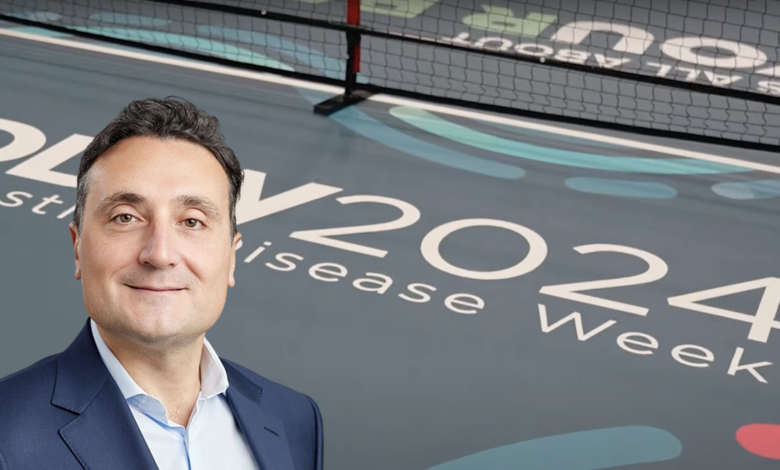Upending Traditional Wisdom at DDW: An Interview with Nello Mainolfi, Ph. D.

As always, this years’ Digestive Disease Week conference provided an exciting range of news and presentations. Hosted at the Walter E. Washington Convention Center in Washington, D.C., the conference brought together more than 13,000 GI professionals.
In addition to more than 400 cutting-edge presentations, a highlight of the show is the poster hall which showcases the incredible diversity and depth of scientific research powering the field. One of the notable posters this year was by Kymera Therapeutics, based in Watertown, MA. Kymera is a clinical stage biopharmaceutical company focused on discovering and developing novel small molecule therapeutics that selectively degrade disease-causing proteins by harnessing the body’s own natural protein degradation system.
PharmaLeaders had the chance to discuss Kymera’s exciting progress with Founder, President and CEO, Nello Mainolfi, Ph.D..
PharmaLeaders: Hi – it’s a pleasure speaking with you. This year’s DDW seems bigger than ever! How are you enjoying the show?
Dr. Mainolfi: Yes, we’re excited to be presenting a poster at DDW for the first time, and sharing updates on our differentiated strategies and novel, first-in-class STAT6 degrader KT-621 with the potential to address multiple highly prevalent immuno-inflammatory diseases. It’s also a great opportunity for us to interact with world renowned leaders in the space.
PharmaLeaders: Ok, well let’s dive right in. Can you provide an overview of KT-621 and its mechanism of action as a STAT6 degrader? How does it compare to existing treatments like dupilumab in terms of efficacy and convenience?
Dr. Mainolfi: KT-621 is an exciting new program in Kymera’s immunology pipeline. This is a once daily, oral STAT6 degrader with the potential for dupilumab-like activity which could address multiple immuno-inflammatory diseases. STAT6 is a genetically validated target and the pathway has been clinically validated by approved IL-4/IL-13-targeting injectable biologics, including dupilumab. By degrading STAT6, we believe KT-621 can selectively block this pathway fully, and importantly, this pathway only, potentially phenocopying upstream biologics, like dupilumab, but in a pill.
PharmaLeaders: What are the key highlights and implications of the preclinical data you presented at DDW and ATS for KT-621?
Dr. Mainolfi: The presentations build on our previously reported preclinical data from our Immunology R&D Day in January 2024. ATS includes additional preclinical findings beyond the early asthma data reported at start of the year. More specifically, the poster presentation includes additional comparison data to dupilumab in a preclinical asthma model assessing efficacy endpoints. Based on the results generated to date, Kymera intends to initiate Phase 1 testing for KT-621 in the second half of 2024 and expects data from the Phase 1 trial to be reported in 2025.
PharmaLeaders: For people who are not familiar with protein degradation, how does Kymera’s targeted protein degradation technology differentiate itself from other approaches in the field of immunology? What are the unique advantages?
Dr. Mainolfi: TPD is a unique modality that has the potential to combine the power of genetic medicine with the benefits of small molecule-based technology, and Kymera has been an early pioneer and leader in harnessing TPD to develop next generation medicines. In the past decade, immunology has been transformed by monoclonal antibodies, or biologics, which have validated biological pathways and provided life changing therapies to patients. However, these antibodies are injected therapies, so less convenient for patients, as well as expensive to manufacture, and therefore have limitations in their uptake. Traditional small molecule inhibitors developed for the same pathways have had challenges reaching the same level of efficacy and safety as biologics.
Given these inherent limitations, we believe that degraders, because of their specificity, catalytic mechanism, and potency have the potential to reach biologics-like activity but provide the convenience of an oral pill. As a result, we believe developing convenient oral options with biologics-like activity and a good safety profile represents an enormous opportunity to expand patient access in many of these markets that are currently dominated by injectable agents.
PharmaLeaders: What prompted Kymera to increase its focus on immune-inflammatory diseases? Can you share some insights on the unmet needs in this area that KT-621 aims to address?
Dr. Mainolfi: Staying true to our strategy, and based on key insights from our KT-474/IRAK4 program, which was the first degrader for immunological diseases to enter the clinic, we have increased our focus in immunology, an area of significant need, which creates an opportunity to potentially provide millions of patients with oral medicine alternatives for indications primarily served by biologics. To put this in context, in a recent industry survey, 75% of patients taking biologics said that they would switch to orals with an equivalent profile. And while traditional small molecule inhibitors offer convenience benefits, they frequently cannot match the powerful pharmacology of biologics as they don’t have the ability to block these pathways at the same level.
Additionally, there are more than 150 million patients in the western world with TH2 inflammation, which drives several immuno-inflammatory diseases such as Atopic Dermatitis, Asthma, Chronic Obstructive Pulmonary Disease, Chronic Rhinosinusitis with Nasal Polyps, Prurigo Nodularis, Eosinophilic Esophagitis, and food allergies. The majority of these patients have no access to approved, effective injectable therapies such as dupilumab. In fact, roughly only 900k patients have received dupilumab to date. Given these reasons, we believe our oral degraders are a differentiated and better solution with the potential to deliver biologics-like activity, but with the convenience of oral dosing, low-cost manufacturing and importantly, because of this profile, the potential to expand the number of patients who can be effectively treated.
PharmaLeaders: That’s certainly a large unmet need. In terms of testing, could you elaborate on the preclinical models used to evaluate KT-621? What were the most significant findings in terms of its efficacy and safety?
Dr. Mainolfi: In preclinical studies, KT-621 demonstrated full inhibition of the IL-4/IL-13 pathway in all relevant human cell contexts with picomolar potency that was superior to dupilumab, and at low oral doses, KT-621 demonstrated near full in vivo STAT6 degradation and was well-tolerated in multiple preclinical toxicity studies.
In a MC903-induced atopic dermatitis mouse model, KT-621 demonstrated robust degradation of STAT6 in spleen and marked reduction of total serum IgE comparable to the activity of dupilumab.
In the intranasal house dust mite (HDM)-induced asthma model in the hIL4/hIL4RA humanized mice, orally administered KT-621 was well tolerated with 30-day daily dosing and demonstrated excellent in vivo efficacy comparable to that of an IL-4Rα saturating dose of dupilumab included in the same study. KT-621 robustly blocked TH2 inflammation including B cell activation, eosinophil recruitment, serum IgE and HDM-specific IgG1 induction, and reduced disease severity in the lung.
These data demonstrate the best-in-pathway potential of KT-621 given its dupilumab-like activity profile and the convenience of an oral pill.
PharmaLeaders: With KT-621 expected to enter Phase 1 trials in the second half of 2024, what are your primary objectives for this trial? What endpoints will you be focusing on?
Dr. Mainolfi: We continue to track toward entering the clinic with KT-621 in the second half of 2024. First, we intend to conduct a Phase 1 healthy volunteer (HV) study evaluating single and multiple ascending doses of KT-621. We will evaluate not only PK and safety but importantly proximal and disease relevant biomarkers such as STAT6 levels in blood and skin, and IgE and TARC levels in blood of HVs which have been shown to be impacted by pathway biologics such as dupilumab. From there, we intend to move quickly into patients.
PharmaLeaders: Assuming positive Phase 1 results, what are the next steps for KT-621? How do you envision its development pathway leading up to potential approval and commercialization?
Dr. Mainolfi: If we can indeed deliver biologics-like activity, a good safety profile and oral once daily dosing, we believe KT-621 could change the treatment paradigm of millions of patients suffering from TH2 driven inflammation. We intend to report Phase 1 data in the first half of 2025 and expect to say more at that time about next steps and our focus indications.
PharmaLeaders: How has the experience with your IRAK4/KT-474 program influenced the development strategy for KT-621? Are there any specific learnings or challenges that you are applying?
Dr. Mainolfi: In the KT-474 IRAK4 Phase 1 trial we observed deep and well tolerated degradation, early signs of clinical efficacy, and high fidelity of translation from preclinical models to patients. These results provide us with key insights for our growing immunology pipeline, and they should help position future programs, such as our STAT6 degrader KT-621, for success.
PharmaLeaders: Are there any strategic partnerships or collaborations that have been particularly beneficial for the development of KT-621 and other TPD candidates? How do these collaborations support your research and development goals?
Dr. Mainolfi: For KT-474, we formed a collaboration with Sanofi, one of the leaders in the I&I space, and that program is now in Phase 2 trials in hidradenitis suppurativa and atopic dermatitis. We have built industry leading knowledge and capabilities that we are leveraging each and every day. And we have developed a best-in-class pipeline of innovative and highly valuable programs, like KT-621, which is wholly owned by Kymera.
PharmaLeaders: As we wrap up, how do you see Kymera’s TPD platform evolving in the field of immunology over the next 5-10 years? What are the broader implications for patients and the healthcare system?
Dr. Mainolfi: Degrader therapies are a big idea that’s upending traditional wisdom about how drugs need to work—and opening doors many people never thought possible given the unique mechanism, oral administration, and broad applicability of this technology. Our goal with TPD is to meaningfully impact patients with limited options across a wide range of diseases within the space. Additionally, we have a powerful drug discovery engine and several other programs in our early pipeline that we expect to disclose in the future.
PharmaLeaders: This technology seems incredibly promising, and we look forward to seeing your progress. Thank you for your time today.
Dr. Mainolfi: Thank you, and looking forward to keeping you updated on our progress.





